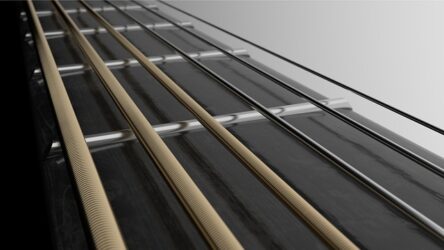Here at BS Fixings, we are specialists in the stainless steel industry, and we are constantly on the search to find out more about it. We stock and sell an extensive range of stainless steel products for construction, gardening, DIY, and decorating projects, but what else is it used for? Well, you might be surprised to learn that guitar strings are actually made out of steel!
As we all know, there are many types of guitars including electric, acoustic, and classical, each with their own string specifications. From the beautiful acoustic tones produced by Eric Clapton to the electrifying riffs by Jimi Hendrix, the composition of the guitar strings can make a huge difference to the sounds the guitar makes. Whether the musician plucks or strikes the strings, the sounds produced by the vibrations can alter with the choice of string material. In this blog post, we are going to explore the use of steel in guitar strings, and how it can influence the overall tones and sounds.
Generally, steel-stringed guitars produce a much stronger, crisper, and louder tone, compared to strings that are manufactured out of nylon. This makes steel a preferred choice for musicians that create rock, country, and metal music. With these musical genres, there tends to be a higher usage of electric guitars, which are commonly made with steel strings.
The Making of Electric Guitars
String composition
There are three types of popular electric guitar strings – nickel-plated steel, pure nickel, and stainless steel. The most common string type is nickel-plated steel, as they are the softest on the fingertips and are resistant to corrosion. They are made from an alloy of steel and nickel, at a ratio of 90:10. The nickel plating offers slightly richer and warmer tones, which when combined with steel, produces a full-bodied and smooth acoustic sound.
Although strings that are made fully from stainless steel are slightly more hard and rough, they are less likely to break with continuous use. They offer a memorable sharp sound, that cannot be replicated with other material compositions.

String construction
Typically, electric guitar strings are made with a steel core wire, that is tested for tension, strength, and elasticity before it can be made into the final product. This steel core can then be either roundwound or flatwound with a fine bronze wire, to create the guitar notes.
Roundwound
Strings that are roundwound are the standard type of string, found on the majority of electric and bass guitars. Rounded-shaped strings produce a bright and lively tone that is incredibly harmonic and suitable for most genres of music.
Flatwound
Flatwound strings, on the other hand, are more suited to jazz musicians, and are found on many electric bass instruments. They produce a darker and deeper sound, as the fingertip noise is reduced from the flatter surface.
Gauge
A gauge relates to the thickness of the string, and how the guitar notes are formed. When the fine bronze wire is wrapped around the steel core, the thickness of the wire will determine what sound it gives off. Thicker strings will create a heavier and deeper tone, whilst thinner strings are finer and brighter in sound.
Why is Steel Popular for Guitar Strings?
Unlike other common string materials such as nylon, steel is resistant to heat and temperature changes. Due to this characteristic, steel strings don’t need as much maintenance or tuning, as they are less likely to become loose over time. Steel is also a very malleable metal, meaning that the manufacturing process of the guitar and its strings is fairly easy.
For hardcore heavy metal players or those who gig regularly, steel strings offer the great advantage of being corrosion resistant. Steel strings will remain intact after heavy usage, being able to withstand sweaty fingers, oils, water, and other residues.
Although sadly, we don’t specialise in guitars, we do specialise in steel wire products! We have a terrific range of steel wire products on our website that we encourage you to take a look at. If you would like to find more information about stainless steel or the products we have to offer, please contact us today and our team will be more than happy to help.






